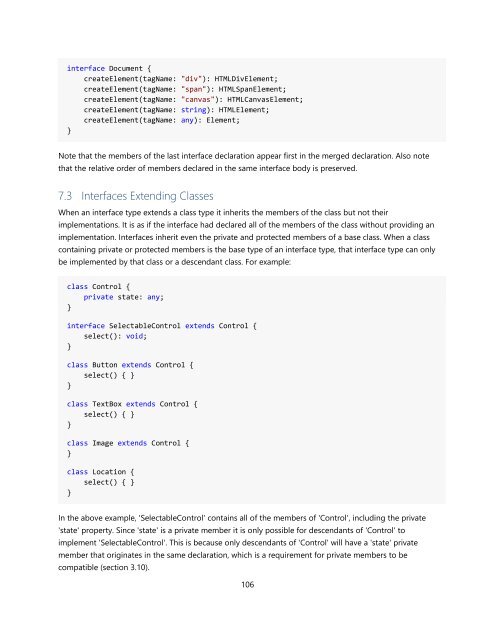TypeScript Language Specification v1.5
TypeScript Language Specification v1.5
TypeScript Language Specification v1.5
Create successful ePaper yourself
Turn your PDF publications into a flip-book with our unique Google optimized e-Paper software.
interface Document {<br />
createElement(tagName: "div"): HTMLDivElement;<br />
createElement(tagName: "span"): HTMLSpanElement;<br />
createElement(tagName: "canvas"): HTMLCanvasElement;<br />
createElement(tagName: string): HTMLElement;<br />
createElement(tagName: any): Element;<br />
}<br />
Note that the members of the last interface declaration appear first in the merged declaration. Also note<br />
that the relative order of members declared in the same interface body is preserved.<br />
7.3 Interfaces Extending Classes<br />
When an interface type extends a class type it inherits the members of the class but not their<br />
implementations. It is as if the interface had declared all of the members of the class without providing an<br />
implementation. Interfaces inherit even the private and protected members of a base class. When a class<br />
containing private or protected members is the base type of an interface type, that interface type can only<br />
be implemented by that class or a descendant class. For example:<br />
class Control {<br />
private state: any;<br />
}<br />
interface SelectableControl extends Control {<br />
select(): void;<br />
}<br />
class Button extends Control {<br />
select() { }<br />
}<br />
class TextBox extends Control {<br />
select() { }<br />
}<br />
class Image extends Control {<br />
}<br />
class Location {<br />
select() { }<br />
}<br />
In the above example, 'SelectableControl' contains all of the members of 'Control', including the private<br />
'state' property. Since 'state' is a private member it is only possible for descendants of 'Control' to<br />
implement 'SelectableControl'. This is because only descendants of 'Control' will have a 'state' private<br />
member that originates in the same declaration, which is a requirement for private members to be<br />
compatible (section 3.10).<br />
106


















